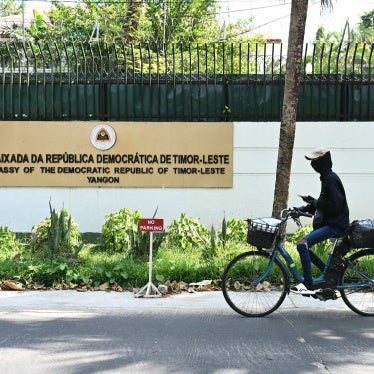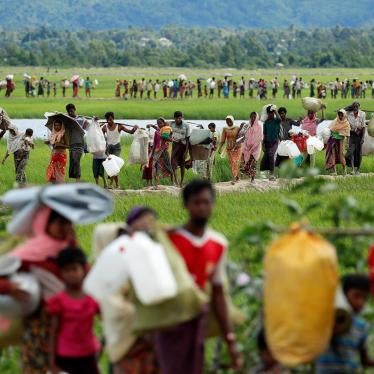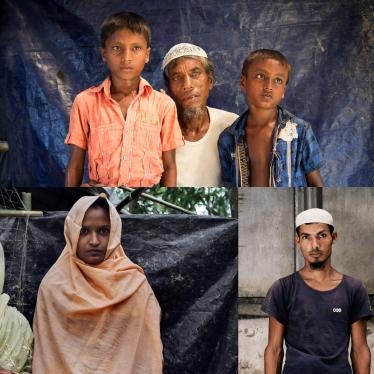New York, October 29, 2015
Dear Ambassador,
We are writing to urge the UN Security Council to hold another formal session, open to the public and media, on the situation in the Democratic People’s Republic of Korea.
As you know, the UN Human Rights Council-mandated Commission of Inquiry on the human rights situation in the Democratic People’s Republic of Korea (DPRK) concluded that “the long-standing and ongoing patterns of systematic and widespread violations” of human rights in the DPRK “meet the high threshold for proof of crimes against humanity.” The commission found that the nature, scale, and gravity of these abuses “reveal a state that does not have any parallel in the contemporary world.”[1]
The commission concluded that the DPRK’s ongoing “open defiance of the United Nations makes this a case where decisive, yet carefully targeted action should be taken by the Security Council in support of the ongoing efforts of the remainder of the United Nations system.”[2] The commission urged the UN Security Council to refer the situation in the DPRK to the International Criminal Court (ICC).[3] The importance of UN Security Council engagement was reflected in last year’s UN General Assembly resolution on the DPRK, which was cosponsored by more than 50 states and supported by 116 states in plenary.
Against this backdrop, last year’s formal discussion in the UN Security Council of the situation in the DPRK was a landmark development for the country’s countless victims. In confirming that massive human rights violations constitute a threat to the maintenance of international peace and security, the council signaled the international community’s willingness to protect the people of the DPRK if Pyongyang continues in its refusal to do so.
The human rights situation in the DPRK remains dire. In his most recent report to the UN General Assembly, the UN Special Rapporteur on the situation of human rights in the DPRK concluded that “grave violations continue to be committed on a large scale and particularly affect the most vulnerable groups.” The Special Rapporteur further called on the international community to “step up efforts to protect the population” of the DPRK and “hold the government accountable for those gross violations.”[4]
The UN Special Rapporteur’s findings were echoed last month by the UN Secretary-General in his report to the General Assembly on the situation of human rights in the DPRK. Notably, the UN Secretary-General called on the international community “to make all possible and reasonable efforts to ensure that the systematic, widespread and grave human rights violations […] are brought to an end” and that “those responsible for crimes are held to account.”[5]
In our view, it is critical that the UN Security Council hold another formal session on the situation in the DPRK this year. International pressure remains a critical avenue to press the DPRK to change. It is no coincidence that last year’s unprecedented engagement by the DPRK at the UN Human Rights Council and at the UN General Assembly followed concerted international attention to its human rights record.
Further, pursuing another formal session in the UN Security Council would be consistent with the UN Special Rapporteur’s two-track strategy for the DPRK.
On the first track, the international community should undertake efforts “to ensure the accountability of those responsible for human rights violations,” including through referral by the UN Security Council to the ICC.[6] Another formal council session on the situation in the DPRK could contribute to efforts aimed at holding perpetrators to account. The transparency afforded by making the session public would magnify this effect.
The second track involves “continuously seeking engagement with the authorities to bring relief” to the people of the DPRK.[7] To this end, we note that the UN Special Rapporteur has made progress towards establishing a human rights contact group with a view to engaging Pyongyang directly on issues of concern relating to the human rights situation in the country.[8]
The newly-established Office of the High Commissioner for Human Rights in Seoul has the potential to provide valuable support for both tracks.
The Commission of Inquiry helped push the desperate plight of the DPRK’s victims to the forefront of the international community’s agenda as a threat to international peace and security. It is essential that the UN Security Council remain actively engaged on the DPRK since, as both the UN Special Rapporteur and the UN Secretary-General have confirmed in their recent reports, the human rights situation remains bleak.
For these reasons, we call on the UN Security Council to hold another formal session on the situation in the DPRK before the end of the year, as an important step in the direction of ensuring greater respect for human rights and accountability.
Sincerely,
Amnesty International
Christian Solidarity Worldwide
Citizens’ Alliance for North Korean Human Rights (NKHR)
Committee for Human Rights in North Korea (HRNK)
Freedom House
Human Rights Watch
International Coalition to Stop Crimes Against Humanity in North Korea (ICNK)
International Federation for Human Rights (FIDH)
Jacob Blaustein Institute for the Advancement of Human Rights
[1] Report of the detailed findings of the Commission of Inquiry on human rights in the Democratic People’s Republic of Korea, A/HRC/25/CRP.1 (7 February 2014) (Commission of Inquiry report), paras 1211-1217. The crimes entail “extermination, murder, enslavement, torture, imprisonment, rape, forced abortions and other sexual violence, persecution on political, religious, racial and gender grounds, the forcible transfer of populations, the enforced disappearance of persons and the inhumane act of knowingly causing prolonged starvation.” Report of the Commission of Inquiry on human rights in the Democratic People’s Republic of Korea, A/HRC/25/63 (Commission of Inquiry main findings), para. 76.
[2] Commission of Inquiry report, para. 1208.
[3] Commission of Inquiry main findings, para. 94(a).
[4] Report of the UN Special Rapporteur on the situation of human rights in the Democratic People’s Republic of Korea, A/70/362 (8 September 2015), summary.
[5] Report of the UN Secretary-General on the situation of human rights in the Democratic People’s Republic of Korea, A/70/393 (25 September 2015), para. 67.
[6] UN Special Rapporteur report, para 78
[7] Ibid.
[8] Ibid, paras 74-76.








